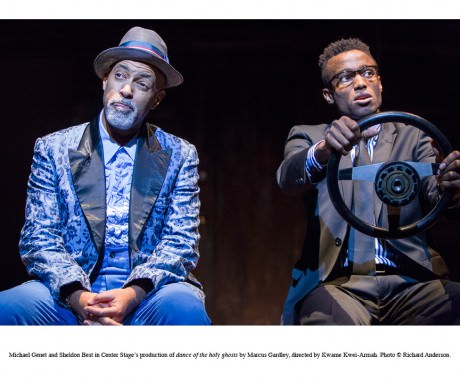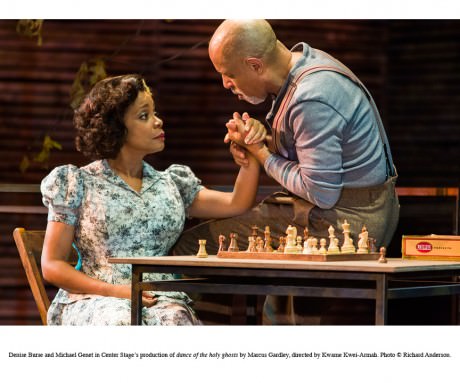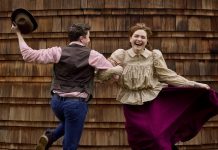Their memories will be in your eyes. It’s a fickle thing, memory; the way it flits in and out of our minds, sometimes so clear it cuts like a knife and other times just a wisp of blurred images or sounds. To write a play on memory and have it executed as successfully as CENTERSTAGE produces Marcus Gardley’s dance of the holy ghosts: a play on memory, is a divine thing. Directed by Kwame Kwei-Armah, this visually stunning and emotionally stirring piece of theatre is a retrospective glance at the life of one man through his memories and the memories of others that shaped him. Heavily influenced by blues music, the soul of the piece shines through in the brilliantly captured essence of memory throughout the production.

Director Kwame Kwei-Armah manages to take the element of memory that playwright Marcus Gardley so skillfully threads into his work and transform it into a living, pulsating character. The memories play out in a fashion that I’ve only ever seen previously used in a cinematographic fashion; flowing seamlessly from present reality and back with blurred lines of actuality in-between. Kwei-Armah executes this technique with superior skill in his cast and creates a remarkable effect of living memory throughout the production. It is this technique, utilized repeatedly throughout the performance that keeps the momentum of the story going and the moments of memory and present reality bleeding together in a fashion that evokes deep emotions and strong thoughts about how memory exists in our lives.
Scenic Designer Neil Patel crafts an exceptional set that lends itself to this play on memory; a duel-level set that separates time from itself as well as outdoors from indoors. Everything is shaded in burnt earth tones, a tribute to the autumnal years of Oscar’s life in which the play takes place, yet these colors are still warm enough to reflect the kindred fire of his lively past. The play depends mostly on the portrayal of the performers to make those memories come to live, so while Patel’s design is stunning to behold – it is simplistic enough to not cloud the visions created throughout the performance.
Costume Designer David Burdick paints his designs in a similar vein of simplicity, allowing the clothes to accentuate the imaginative characters of Gardley’s script. The powder-blue paisley zoot suit comes to mind, even coming to life as a character all its own at one point; the epitome of blues from the Delta. Burdick takes care to keep patterns and colors occurring on characters during their scenes in memory, making them more vibrant when they happen, like little Darlene’s bright pink dress. This creates a stirring juxtaposition when the aforementioned zoot suit comes back from the past to become a part of the present.
A nod needs to be given to the proverbial ‘everyman’ character Doug Eskew for his impressive rendition of three different characters in the production. Each distinctive in voice, mannerism and appearance, Eskew achieves hints of comedy in them all and brings a good wave of levity to his scenes; an easy character for the audience to agree with whether he’s the saucy Bluesy Tux come to life or the quick talking Big Ass Willie Smalls.
The thing that the performers achieve best is existing at varying ages across their timelines. Darlene (Chandra Thomas) and Marcus (Sheldon Best) are the two most vivid examples of this notion. Thomas, appearing first as the bouncy sprightly little girl whose daddy can do no wrong, later morphs into a strong woman raising a boy on her own who has found all the flaws of that very same father and triumphed in spite of them. Thomas’ portrayal of the younger Darlene is eager and energetic, bouncing with an indefatigable energy that all little girls have when they are excited to see their father.
Best, as the grandson character, makes the transition from young Marcus to his older self with grace and ease. A wildly out of place youth, the epitome of awkward and nerdy. His melodramatic hysterics over his box of 64 Crayola crayons in the scene with Tanisha (Jasmine Carmichael) is riotous and has the audience rolling with laughter. That same spastic vehemence is honed more sharply in one of his final scenes with Oscar, furiously telling him off in the car. Best is a well articulated performer that puts emotional emphasis in all the right places when it comes to expressing his character’s internal desires and needs.
Fragmented memories and pieces of people are all that remains for Oscar (Michael Genet). The play’s protagonist finds himself caught between two worlds, his present reality and his memories of the past. Genet plays sublimely against Viola (Denise Burse) in moments of his fond recollections of her. Burse has a sultry lounge lizard voice when she takes to singing, echo-enhanced to further augment the notion that she’s only in Oscar’s mind. But her presence needs no enhancements as she is fully grounded and focused whenever she is on the stage. It is captivating to watch her be so sharp and demanding in the earlier years of her life, and to see that transformed into her later years, something much more reserved and meek. The pair play brilliantly together and create ripe moments of romance and drama that keep the performance on its heels.
When Genet gets to finally belting out his blues in act II it is clear he is singing from a place deep in his soul; touched by the character’s plight and moved by the character’s struggle. His voice is the quintessential blend of rough and smooth to give it that jazzy blues sound and it makes for a truly revitalizing moment of memory when he sings.

Memories are fleeting and they are only how we see them. dance of the holy ghosts: a play on memory is a play you’ll want to see before it flies away from Baltimore’s mind’s eye.
Running Time: Approximately two hours, with one intermission.
dance of the holy ghosts plays through November 17, 2013 at CENTERSTAGE— 700 N. Calvert Street, in Baltimore, MD. For tickets call the box office at (410) 332-0033, or purchase them online.




